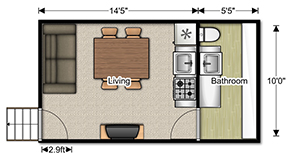Did you survive this weekend’s apocalypse? In case you didn’t know, some internet conspiracy began to circulate last week that the world was scheduled to end on Saturday. It all started with some vague remarks from a German politician who said we would never forget the events of Sept. 24. Obviously, nothing out of the ordinary happened except for the continued fighting in the Ukraine. It was just another weekend for 90 percent of the world. Like most people, you probably didn’t pay a second thought to renewed claims of Armageddon and the end of the world. Every of couple years, we hear the rantings of some lunatic who thinks the sky is falling. First, it was the Y2K pandemonium that claimed airplanes would fall from the sky and technology would run amok before dooming us all. Then, it was the 2012 conspiracy that predicated on the Mayan prediction of the End of Times. And of course, the COVID19 pandemic didn’t assuage those fears. So, when will the world end?
Preparing for The Worse While Hoping for the Best

No one really knows when the world will end, but that hasn’t stopped people from guessing the final expiration. It’s inherent to the human condition. We have some obsession with expiration and knowing when it will all come to a screeching halt. Despite the merits of optimism, we are fatalists at heart. Doom and gloom are always a few notches above calm and tranquil. We may say that we crave stability, but seem to thrive in the throes of chaos. When life gets a little too easy or predictable, we cast our gaze to troubled waters to break up the vicious cycle of monotony. We don’t have to look far to sow the seeds of doubt when impending calamity. News headlines remain saturated with tales of woe and catastrophe. Living in an ultra connected and digitized society feeds us a constant stream of violence and despair. Most of us have to go out the way to avoid bad news, so it’s no wonder how prophecies of Armageddon grab our attention before images of puppy dogs and happy endings.
Calming Fears While Nurturing Stability

Truthfully, there’s always someone that stands to profit from preying on our fears. We aren’t trying to get all conspiracy theory on you either. Insurance salesmen are a great example. They can’t sell you a tangible good, so they try to pander to your inner weakness of the worst case scenarios and sell you “stability,” which isn’t even tangible. You then pay premiums every month for something that you will likely never benefit from. Governments will even require you to buy certain insurances, such as car insurance for driving, for the right to enjoy this “privilege” even though you pay taxes for it every year or when you fill up your gas tank. Not to say that insurance isn’t important, but there has to be a better way of protecting yourself while receiving a return on your investment. Fortunately, there’s a better way. A panelized safe room or steel bunker from U.S. Safe Room is a way to calm your fears while actually getting to benefit from lifelong protection.
After paying years on an insurance policy, what do you stand to benefit from all those years of paying premiums if you never have to use it? Does the company refund those premiums if you never use it or at least pay you dividends or give you stock options in the company? Of course not. Panelized safe rooms give you both protection and a product that’s yours to keep that can be used for years to come. Even if a killer hurricane or tornado doesn’t come to town (and honestly, why would you want that?) you will still have a formidable steel structure that has a variety of uses. Many customers have used their safe rooms and tornado shelters for wine cellars, movie rooms, storage areas, man caves and she sheds or even as spare bedrooms when not in use.
